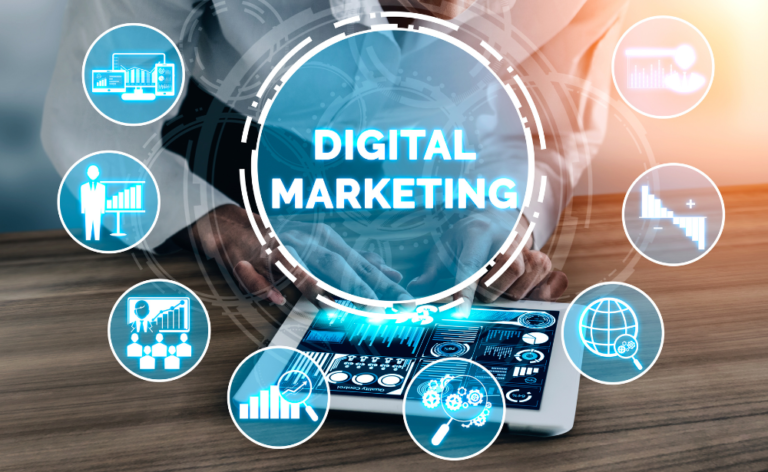Have you ever wondered how companies like Amazon, Uber, and Netflix revolutionized their industries? The answer lies in digital business. This article will take you on a journey to understand digital business, its key components, and why it matters in today’s world.
Defining Digital Business
A digital business uses technology to create new value in business models, customer experiences, and internal capabilities that support its core operations. It’s not just about having a website or a social media presence. It’s about integrating digital technologies into every aspect of the business to streamline operations, enhance customer experiences, and create new revenue streams.
Key Components of Digital Business
Digital Strategy
Every digital business starts with a clear digital strategy. This strategy outlines how a company will use digital technologies to achieve its goals. It’s like a roadmap guiding the company through its digital transformation journey.
Customer Experience
Customer experience is at the heart of digital business. Businesses leverage digital tools to understand customer needs, preferences, and behaviours. This understanding helps create personalized experiences that boost customer satisfaction and loyalty.
Data Analytics
Data is the new oil. Digital businesses collect and analyze vast amounts of data to gain insights into their operations and customer behaviours. These insights are crucial for making informed decisions and driving business growth.
Technology Infrastructure
A robust technology infrastructure is essential for digital business. This includes cloud computing, cybersecurity measures, and advanced software solutions that ensure smooth and secure operations.
Innovation and Agility
Digital businesses are known for innovating and adapting quickly to changing market conditions. This agility is a key factor in their success.
How Digital Business Differs from Traditional Business
Traditional businesses rely heavily on physical interactions and manual processes. In contrast, digital businesses leverage technology to automate processes, reach a global audience, and operate 24/7.
For example, a traditional retail store is limited by its physical location and hours of operation, whereas an e-commerce store can sell products to customers worldwide at any time.
Benefits of Digital Business
Increased Efficiency
Digital tools and technologies streamline business processes, reducing the time and effort required to complete tasks. This efficiency leads to cost savings and increased productivity.
Better Customer Insights
Digital businesses can gather detailed data on customer behaviours and preferences. These insights enable businesses to tailor their offerings and marketing strategies to meet customer needs better.
Enhanced Customer Experience
With digital technologies, businesses can provide seamless and personalized experiences to their customers. This can lead to higher customer satisfaction and loyalty.
New Revenue Streams
Digital businesses can create new revenue streams through innovative business models and digital products. For instance, subscription services and digital products like e-books and online courses are examples of new revenue streams enabled by digital technology.
Examples of Successful Digital Businesses
Amazon
Amazon started as an online bookstore but has since transformed into the world’s largest e-commerce platform. Its success lies in its relentless focus on customer experience, data-driven decision-making, and continuous innovation.
Uber
Uber disrupted the traditional taxi industry by leveraging digital technology to connect riders with drivers. Its easy-to-use app, dynamic pricing, and customer-centric approach have made it a global leader in ride-sharing.
Netflix
Netflix revolutionized the entertainment industry by offering on-demand streaming services. Its success is driven by its ability to leverage data analytics to understand viewer preferences and provide personalized content recommendations.
The Role of Technology in Digital Business
Technology is the backbone of digital business. From cloud computing and artificial intelligence to the Internet of Things (IoT) and blockchain, various technologies enable businesses to innovate, scale, and operate efficiently. For example, AI-powered chatbots can handle customer inquiries 24/7, while blockchain ensures secure and transparent transactions.
Challenges in Implementing Digital Business
Digital Transformation
Transitioning from a traditional to a digital business model requires a significant cultural and operational shift. This transformation can be challenging and requires strong leadership and a clear vision.
Data Security
With the increase in digital transactions and data collection, businesses face heightened risks of cyberattacks. Ensuring robust cybersecurity measures is crucial to protect sensitive information.
Technology Adoption
Adopting new technologies can be costly and time-consuming. Businesses need to ensure they have the right skills and resources to implement and maintain these technologies.
Regulatory Compliance
Digital businesses must navigate a complex landscape of regulations and compliance requirements. This includes data protection laws, consumer rights, and industry-specific regulations.
Strategies for Transitioning to a Digital Business
Develop a Clear Digital Strategy
Start with a clear digital strategy that aligns with your business goals. Identify the areas where digital technologies can add the most value and create a roadmap for implementation.
Invest in Technology
Invest in the right technologies that will support your digital transformation. This includes cloud computing, data analytics tools, cybersecurity solutions, and customer relationship management (CRM) systems.
Build a Digital Culture
Foster a culture of innovation and agility within your organization. Encourage employees to embrace digital tools and processes and provide training to build digital skills.
Focus on Customer Experience
Put the customer at the centre of your digital strategy. Use digital tools to understand customer needs and preferences and create personalized experiences that drive loyalty and satisfaction.
Future Trends in Digital Business
Artificial Intelligence and Machine Learning
AI and machine learning will continue to play a significant role in digital business. These technologies can automate processes, provide insights from data, and enhance customer experiences.
Internet of Things (IoT)
The IoT will enable businesses to collect and analyze data from connected devices, leading to more efficient operations and new business models.
Blockchain
Blockchain technology will provide secure and transparent transactions, reducing the risk of fraud and enhancing trust in digital transactions.
5G Connectivity
The rollout of 5G connectivity will enable faster and more reliable internet connections, supporting the growth of digital business and enabling new applications and services.
Conclusion
Digital business is not just a trend; it’s the future of how companies operate and compete. By using digital technologies, businesses can improve efficiency, enhance customer experiences, and create new revenue streams.
However, the journey to becoming a digital business comes with its challenges. With a clear strategy, the right technologies, and a customer-centric approach, businesses can successfully navigate this transformation and thrive in the digital age.
FAQs
1. What is a digital business?
A digital business uses digital technologies to create new value in business models, customer experiences, and internal capabilities that support its core operations.
2. How does a digital business differ from a traditional business?
A digital business leverages technology to automate processes, reach a global audience, and operate 24/7, whereas traditional businesses rely on physical interactions and manual processes.
3. What are the benefits of digital business?
Digital businesses benefit from increased efficiency, better customer insights, enhanced customer experiences, and new revenue streams.
4. What are some examples of successful digital businesses?
Examples include Amazon, Uber, and Netflix, which have revolutionized their industries through digital innovation.
5. What challenges do businesses face when transitioning to a digital business model?
Some significant digital business challenges include digital transformation, data security, technology adoption, and regulatory compliance.







